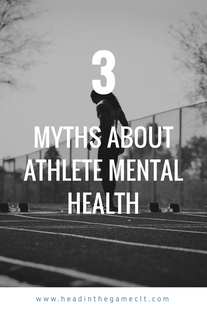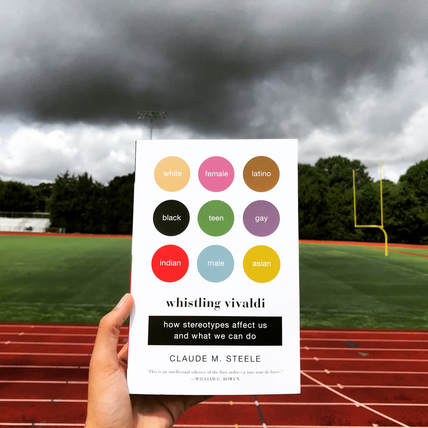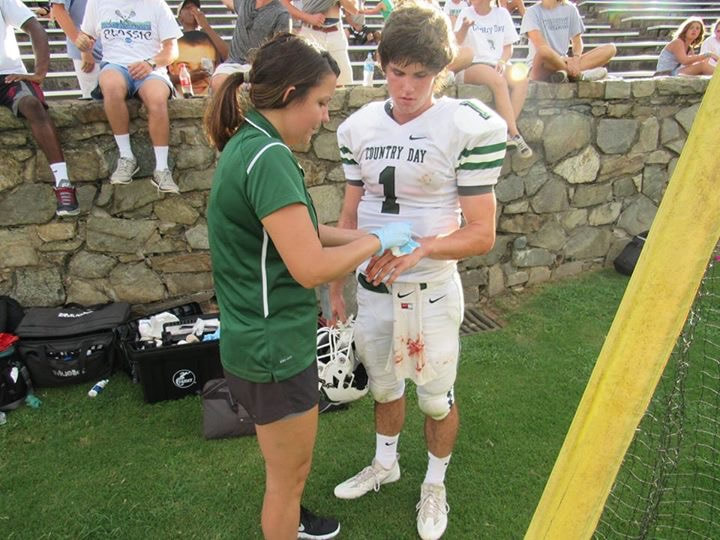 Each year our faculty is assigned a book for our very own "summer reading". Fortunately, throughout the years I have really enjoyed the selections. This year is no different. We are to read Whistling Vivaldi: How Stereotypes Affect Us and What We Can Do by Claude Steele. I just started reading yesterday, and I can't wait to finish. Steele focuses on the effects of stereotype threat on performance, attitudes and beliefs, both about others and ourselves. As I was reading I began to think about athletes and their mental health. Does stereotype threat affect athlete performance? Of course it does, Steele talks about this in Whistling Vivaldi. Internalized views of yourself can help, and hinder, your athletic performance. Does stereotype threat prevent athletes from seeking out help when they need it? Maybe, but I know my Athletic Training room was always packed full with athletes waiting to tell me about their most recent physical ailment. Does stereotype threat prevent athletes from seeking out help for their mental health? Well, I am not necessarily an expert, but I do know that my counseling office has been extremely empty compared to my athletic training room. I will definitely give a full review of Whistling Vivaldi when I am done reading and processing, but wanted to leave you with these three myths that are impacting our athletes mental health. The more we talk about the truth behind athlete mental health, the smaller the threat will become. Three Myths About Athlete Mental Health1. Athletes exercise all the time, and exercise is good for your mental health, so athletes shouldn't have any problems with mental illness.
It is true that exercise has significant benefits on mental health, but for some athletes their sport becomes all encompassing. The desire to perform at your best each day and the pressure athletes feel to be perfect can be detrimental for their mental health. 2. It is better to see a Sports Psychologist than a Mental Health Professional. I think the correct thing to say is it is more acceptable to see a Sports Psychologist than a Mental Health Professional. Sports Psychologists work to help players enhance performance, recover from injury, and develop mental skills to increase sport productivity. But, athletes are more than their sport, and Sports Psychologists do not specialize in mental illness or coping with problems outside of sport. 3. The majority of athletes stressor's are related to their sport. Athletes are people too. I am going to say it again, athletes are people too. While they may be more comfortable talking about problems in their game, they also experience everything non-athletes do. Academic difficulties, life transitions, relational dysfunction, grief, and poverty are all stressors athletes face daily that are then compounded by poor performance on the court or field. What books are you reading this summer? Do you have thoughts on the "athlete stereotype?" Have you read, Whistling Vivaldi? * Because I believe in full disclosure, I use Amazon Affiliate links and will make a small amount of money, at no extra cost to you, if you purchase any products using the link provided.
2 Comments
The path to my graduate degree in Clinical Mental Health Counseling would probably give some of my classmates extreme anxiety. I only applied to one school. I decided to apply two weeks before the deadline. I submitted my application on the day that it was due. I did not know of any theorists besides Frued ( who doesn't know Frued?) and the only Psychology class I had ever taken was focused on athletes. But, with all that said, I have never felt like I belonged somewhere more. At the beginning of each semester we go around the room, introduce ourselves and say a little bit about our background. It usually goes something like this: "Hi! My name is Tina and I'm on the Clinical Mental Health track. I worked as an Athletic Trainer at a high school for six years before beginning this program. I am from Boston and a huge sports fan!" The responses range from: " Ohhhh.. so you can help me get back in to shape?", "How did you end up here?" and my personal favorite "Go Yankees! / Patriots suck!" Yes, I can probably help you get back in shape, but I actually specialize in working with injured athletes. I guess you can say that I have always been drawn toward people who need support in reaching their full potential. I am not exactly sure how I ended up here, but I do know there is no where else I am supposed to be. My path to getting here may not be traditional, but does that make it wrong? So, when did I know I wanted to be in the mental health field? The most honest answer I can give is "the day I actually submitted my application to graduate school?" but I think a part of me always knew it was where I belonged. I remember sitting in the back of my parents massive red van with my bff Rose, answering my mothers question about what I wanted to be when I grew up with a certain "psychiatrist!"
It could have been when an athlete I was working with committed suicide. As a result of that experience for my senior thesis I conducted research on the psychosocial aspects of athletic training, instead of the typical injury rehabilitation or diagnosis topics. But, it wasn't until I sat down and made a pros and cons list about my job as a high school athletic trainer that I realized it was truly what I was most passionate about. Even though I don't currently work as an athletic trainer, I still haven't left the world of athletics. My internship is at the Athletic Academic Center at a University, and I currently advise all concussed student athletes on their return to academics at the high school where I work. I can still be found on the football sideline every Friday. I believe my background has given me a special opportunity to connect with and support a special population that needs mental health support more than we recognize. I hope you follow me along this journey! I would love to hear from you! Questions: Did you always know what you wanted to do in life? Have you taken a non-traditional path to your current career? What would you like to know about athlete mental health? |
Christina TaylorFormer Athletic Trainer, current Mental Health Professional. Boston sports lover. Archives
December 2023
Categories
All
|



 RSS Feed
RSS Feed